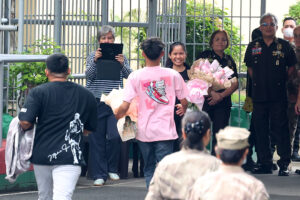By Chloe Mari A. Hufana,Reporter
ADVOCATES urged President Ferdinand R. Marcos, Jr. to grant an absolute pardon to Mary Jane F. Veloso, a Filipina who was previously a death-row prisoner in Indonesia, to address what they describe as “a grave miscarriage of justice,” asserting that such a move will not significantly impact Manila’s relations with Jakarta.
“It is wise and proper for President Marcos to grant absolute pardon on Mary Jane… to correct an injustice done to her,” National Union of Peoples’ Lawyers (NUPL) President Ephraim B. Cortez told BusinessWorld in a Viber message over the weekend.
“It is clear that Mary Jane was a victim of human trafficking. Under international conventions on human trafficking, and under both Indonesian and Philippine laws, trafficked victims are exempted from criminal liability, meaning that they should not be prosecuted for the crimes they committed as trafficked persons,” he added.
He noted this issue was never raised during her trial in Indonesia, leading to her prosecution for drug trafficking when she should have been exempted from criminal liability.
“Since Mary Jane is now under the custody of the Philippine government, it has the power to correct that injustice, and the way to do it is through executive clemency by granting her an absolute pardon.”
The President has absolute power to grant executive clemency.
Josue Raphael J. Cortez, lecturer at the De La Salle-College of St. Benilde’s School of Diplomacy and Governance, said granting clemency would not drastically affect Manila and Jakarta’s diplomatic relations.
“[It] would not drastically affect our ties with Indonesia given [it] already transitioned all the legalities of Veloso’s case to the Philippine judicial system. Therefore, such decisions are beyond Indonesian purview by now,” he told BusinessWorld in a Messenger chat.
He, however, noted that illicit drug cases are something Jakarta is stringent with, it might view Manila’s drug policies as “not that serious enough” which “may affect their decision to our future pleas, if ever.”
“There will be not [many] diplomatic setbacks, if ever, as Indonesia also respects the Philippines’ sovereignty and jurisdiction on the matter. However, should similar circumstances transpire again in the near future, then Jakarta might be wary already of granting similar pleas relating to such circumstances.”
NUPL’s Mr. Cortez also noted that Ms. Veloso is now entitled to remedies and protection the country could afford her as jurisdiction over her case has been transferred back to the Philippine government.
“This includes [availing] of clemency through absolute pardon,” he said, noting the nine Australian convicts turned over by the Indonesians to the Australians who were released immediately as soon as they landed in Australia.
“The Philippine government should do the same [to Ms. Veloso],” he noted.
The President last week said he is still consulting with legal experts on Ms. Veloso’s clemency request, adding “We are still far from that… We still have to have a look at really what her status is.”
Ms. Veloso was convicted in 2010 for drug trafficking in Indonesia after being caught with heroin in her luggage. However, evidence and testimonies that emerged later strongly suggest that Ms. Veloso was a victim of human trafficking, exploited by a syndicate that used her as an unwitting drug courier.
She received a last-minute reprieve from execution in 2015 after the late former President Benigno Simeon C. Aquino III appealed to the Indonesian government, arguing she could be a vital witness in prosecuting drug syndicates.
She arrived in Manila last Dec. 18 after almost 15 years of incarceration in Indonesian prison.
